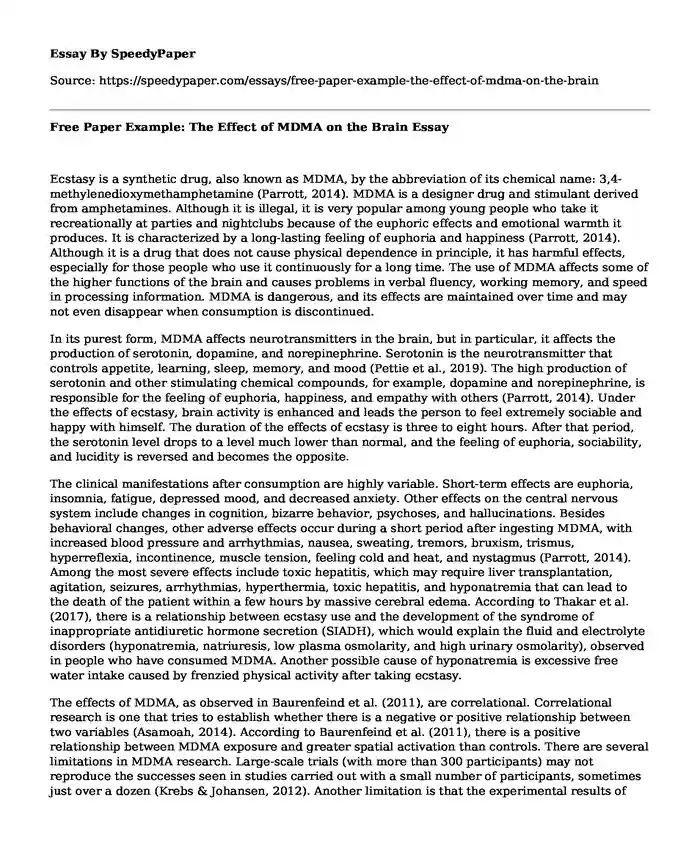Ecstasy is a synthetic drug, also known as MDMA, by the abbreviation of its chemical name: 3,4-methylenedioxymethamphetamine (Parrott, 2014). MDMA is a designer drug and stimulant derived from amphetamines. Although it is illegal, it is very popular among young people who take it recreationally at parties and nightclubs because of the euphoric effects and emotional warmth it produces. It is characterized by a long-lasting feeling of euphoria and happiness (Parrott, 2014). Although it is a drug that does not cause physical dependence in principle, it has harmful effects, especially for those people who use it continuously for a long time. The use of MDMA affects some of the higher functions of the brain and causes problems in verbal fluency, working memory, and speed in processing information. MDMA is dangerous, and its effects are maintained over time and may not even disappear when consumption is discontinued.
In its purest form, MDMA affects neurotransmitters in the brain, but in particular, it affects the production of serotonin, dopamine, and norepinephrine. Serotonin is the neurotransmitter that controls appetite, learning, sleep, memory, and mood (Pettie et al., 2019). The high production of serotonin and other stimulating chemical compounds, for example, dopamine and norepinephrine, is responsible for the feeling of euphoria, happiness, and empathy with others (Parrott, 2014). Under the effects of ecstasy, brain activity is enhanced and leads the person to feel extremely sociable and happy with himself. The duration of the effects of ecstasy is three to eight hours. After that period, the serotonin level drops to a level much lower than normal, and the feeling of euphoria, sociability, and lucidity is reversed and becomes the opposite.
The clinical manifestations after consumption are highly variable. Short-term effects are euphoria, insomnia, fatigue, depressed mood, and decreased anxiety. Other effects on the central nervous system include changes in cognition, bizarre behavior, psychoses, and hallucinations. Besides behavioral changes, other adverse effects occur during a short period after ingesting MDMA, with increased blood pressure and arrhythmias, nausea, sweating, tremors, bruxism, trismus, hyperreflexia, incontinence, muscle tension, feeling cold and heat, and nystagmus (Parrott, 2014). Among the most severe effects include toxic hepatitis, which may require liver transplantation, agitation, seizures, arrhythmias, hyperthermia, toxic hepatitis, and hyponatremia that can lead to the death of the patient within a few hours by massive cerebral edema. According to Thakar et al. (2017), there is a relationship between ecstasy use and the development of the syndrome of inappropriate antidiuretic hormone secretion (SIADH), which would explain the fluid and electrolyte disorders (hyponatremia, natriuresis, low plasma osmolarity, and high urinary osmolarity), observed in people who have consumed MDMA. Another possible cause of hyponatremia is excessive free water intake caused by frenzied physical activity after taking ecstasy.
The effects of MDMA, as observed in Baurenfeind et al. (2011), are correlational. Correlational research is one that tries to establish whether there is a negative or positive relationship between two variables (Asamoah, 2014). According to Baurenfeind et al. (2011), there is a positive relationship between MDMA exposure and greater spatial activation than controls. There are several limitations in MDMA research. Large-scale trials (with more than 300 participants) may not reproduce the successes seen in studies carried out with a small number of participants, sometimes just over a dozen (Krebs & Johansen, 2012). Another limitation is that the experimental results of MDMA on animals have not been extrapolated to humans. However, despite the limitations of extrapolating the results obtained in animals to humans, there is sufficient evidence that the consumption of MDMA induces very selective and persistent neurotoxic effects in the cerebral serotonergic system when administered repeatedly in high doses. The extrapolation of the results obtained through animal-to-human models is not without limitations, due to significant differences between species regarding the vulnerability of neurotoxic effects.
References
Asamoah, M. K. (2014). Re-examination of the limitations associated with correlational research. Journal of Educational Research and Reviews, 2(4), 45-52. http://www.sciencewebpublishing.net/jerr/archive/2014/July/pdf/Asamoah.pdf
Bauernfeind, A. L., Dietrich, M. S., Blackford, J. U., Charboneau, E. J., Lillevig, J. G., Cannistraci, C. J., & Cascio, C. (2011). Human ecstasy use is associated with increased cortical excitability: an fMRI study. Neuropsychopharmacology, 36(6), 1127-1141. https://dx.doi.org/10.1038%2Fnpp.2010.244
Krebs, T. S., & Johansen, P. Ø. (2012). Methodological weaknesses in non-randomized studies of ecstasy (MDMA) use: A cautionary note to readers and reviewers. Neuropsychopharmacology, 37(4), 1070-1071. https://dx.doi.org/10.1038%2Fnpp.2011.202
Parrott, A. C. (2014). The potential dangers of using MDMA for psychotherapy. Journal of Psychoactive Drugs, 46(1), 37-43. https://doi.org/10.1080/02791072.2014.873690
Pettie, M., Oakly, A., Harper, D. N., & Ellenbroek, B. A. (2019). Genetic deletion of the serotonin transporter differentially influences the behavioral effects of MDMA. Journal of Psychopharmacology, 33(3), 355-363. https://doi.org/10.1177%2F0269881118822156
Thakkar, A., Parekh, K., El Hachem, K., & Mohanraj, E. M. (2017). A case of MDMA-associated cerebral and pulmonary edema requiring ECMO. Case Reports in Critical Care, 6417012(1), 1-4. https://dx.doi.org/10.1155%2F2017%2F6417012
Cite this page
Free Paper Example: The Effect of MDMA on the Brain. (2023, Dec 25). Retrieved from https://speedypaper.com/essays/free-paper-example-the-effect-of-mdma-on-the-brain
Request Removal
If you are the original author of this essay and no longer wish to have it published on the SpeedyPaper website, please click below to request its removal:
- Free Essay with a Systematic Review on the Use of Some Drugs in Clinical Pharmacology
- Essay Sample on How Social Media Has Increased Depression and Anxiety in Teenagers
- Essay Example on Perspectives on Argument About Spread of Coronavirus Disease
- Essay Example: Background of Why the Study Was Done
- Free Essay Example: Concepts of Aging
- Sources and Uses of Vitamin D - Essay Sample
- Essay on Oxygen Diffusion Across Alveolar and Capillary Walls
Popular categories





